Greek > QUESTION PAPER & MARK SCHEME > OCR A Level Classical Greek H444/04 Verse Literature. QUESTION PAPER AND MARKING SCHEME (All)
OCR A Level Classical Greek H444/04 Verse Literature. QUESTION PAPER AND MARKING SCHEME
Document Content and Description Below
1 Read the following passages and answer the questions. τὴν δὲ βαρὺ στενάχων προσέφη πόδας ὠκὺς Ἀχιλλεύς· ‘μῆτερ ἐμή, τὰ μὲν �... �ρ μοι Ὀλύμπιος ἐξετέλεσσεν· ἀλλὰ τί μοι τῶν ἦδος ἐπεὶ φίλος ὤλεθ᾽ ἑταῖρος Πάτροκλος, τὸν ἐγὼ περὶ πάντων τῖον ἑταίρων ἶσον ἐμῇ κεφαλῇ; τὸν ἀπώλεσα, τεύχεα δ᾽ Ἕκτωρ 5 δῃώσας ἀπέδυσε πελώρια θαῦμα ἰδέσθαι καλά· τὰ μὲν Πηλῆϊ θεοὶ δόσαν ἀγλαὰ δῶρα ἤματι τῷ ὅτε σε βροτοῦ ἀνέρος ἔμβαλον εὐνῇ. αἴθ᾽ ὄφελες σὺ μὲν αὖθι μετ᾽ ἀθανάτῃς ἁλίῃσι ναίειν, Πηλεὺς δὲ θνητὴν ἀγαγέσθαι ἄκοιτιν. 10 νῦν δ᾽ ἵνα καὶ σοὶ πένθος ἐνὶ φρεσὶ μυρίον εἴη παιδὸς ἀποφθιμένοιο, τὸν οὐχ ὑποδέξεαι αὖτις οἴκαδε νοστήσαντ᾽, ἐπεὶ οὐδ᾽ ἐμὲ θυμὸς ἄνωγε ζώειν οὐδ᾽ ἄνδρεσσι μετέμμεναι, αἴ κε μὴ Ἕκτωρ πρῶτος ἐμῷ ὑπὸ δουρὶ τυπεὶς ἀπὸ θυμὸν ὀλέσσῃ, 15 Πατρόκλοιο δ᾽ ἕλωρα Μενοιτιάδεω ἀποτίσῃ.’ τὸν δ᾽ αὖτε προσέειπε Θέτις κατὰ δάκρυ χέουσα· ‘ὠκύμορος δή μοι τέκος ἔσσεαι, οἷ᾽ ἀγορεύεις· αὐτίκα γάρ τοι ἔπειτα μεθ᾽ Ἕκτορα πότμος ἑτοῖμος.’ Homer, Iliad XVIII.78–96 (a)* How does Homer emphasise the sense of sadness and regret in this extract? You should refer both to the content and to the language of the passage. [15] 3 © OCR 2021 H444/04 Oct21 Turn over ‘στεῦτο γὰρ Ἡφαίστοιο πάρ᾽ οἰσέμεν ἔντεα καλά. ἄλλου δ᾽ οὔ τευ οἶδα τεῦ ἂν κλυτὰ τεύχεα δύω, εἰ μὴ Αἴαντός γε σάκος Τελαμωνιάδαο. ἀλλὰ καὶ αὐτὸς ὅ γ᾽ ἔλπομ᾽ ἐνὶ πρώτοισιν ὁμιλεῖ ἔγχεϊ δηϊόων περὶ Πατρόκλοιο θανόντος.’ 5 τὸν δ᾽ αὖτε προσέειπε ποδήνεμος ὠκέα Ἶρις· ‘εὖ νυ καὶ ἡμεῖς ἴδμεν ὅ τοι κλυτὰ τεύχε᾽ ἔχονται· ἀλλ᾽ αὔτὸς ἐπὶ τάφρον ἰὼν Τρώεσσι φάνηθι, αἴ κέ σ᾽ ὑποδείσαντες ἀπόσχωνται πολέμοιο Τρῶες, ἀναπνεύσωσι δ᾽ ἀρήϊοι υἷες Ἀχαιῶν 10 τειρόμενοι· ὀλίγη δέ τ᾽ ἀνάπνευσις πολέμοιο.’ ἣ μὲν ἄρ᾽ ὣς εἰποῦσ᾽ ἀπέβη πόδας ὠκέα Ἶρις, αὐτὰρ Ἀχιλλεὺς ὦρτο Διῒ φίλος· ἀμφὶ δ᾽ Ἀθήνη ὤμοις ἰφθίμοισι βάλ᾽ αἰγίδα θυσσανόεσσαν, ἀμφὶ δέ οἱ κεφαλῇ νέφος ἔστεφε δῖα θεάων 15 χρύσεον, ἐκ δ᾽ αὐτοῦ δαῖε φλόγα παμφανόωσαν. Homer, Iliad XVIII.191–206 (b) Translate στεῦτο γὰρ … Πατρόκλοιο θανόντος (lines 1–5). [5] (c) τὸν δ᾽ αὖτε … φλόγα παμφανόωσαν (lines 6–16): what support does Achilles receive from the gods in these lines? [6] 4 © OCR 2021 H444/04 Oct21 2 Read the following passages and answer the questions. Μήδεια σοφὴ γὰρ οὖσα, τοῖς μέν εἰμ᾽ ἐπίφθονος, τοῖς δ᾽ ἡσυχαία, τοῖς δὲ θατέρου τρόπου, τοῖς δ᾽ αὖ προσάντης· εἰμὶ δ᾽ οὐκ ἄγαν σοφή, σὺ δ᾽ αὖ φοβῇ με· μὴ τί πλημμελὲς πάθῃς; οὐχ ὧδ᾽ ἔχει μοι, μὴ τρέσῃς ἡμᾶς, Κρέον, 5 ὥστ᾽ ἐς τυράννους ἄνδρας ἐξαμαρτάνειν. σὺ γὰρ τί μ᾽ ἠδίκηκας; ἐξέδου κόρην ὅτῳ σε θυμὸς ἦγεν. ἀλλ᾽ ἐμὸν πόσιν μισῶ· σὺ δ᾽, οἶμαι, σωφρονῶν ἔδρας τάδε. καὶ νῦν τὸ μὲν σὸν οὐ φθονῶ καλῶς ἔχειν· 10 νυμφεύετ᾽, εὖ πράσσοιτε· τήνδε δὲ χθόνα ἐᾶτέ μ᾽ οἰκεῖν. καὶ γὰρ ἠδικημένοι σιγησόμεσθα, κρεισσόνων νικώμενοι. Κρέων λέγεις ἀκοῦσαι μαλθάκ᾽, ἀλλ᾽ ἔσω φρενῶν ὀρρωδία μοι μή τι βουλεύῃς κακόν. 15 Euripides, Medea 303–317 (a) σοφὴ γὰρ … καλῶς ἔχειν (lines 1–10): how does Medea reassure Creon that she means him no harm? [6] (b) Translate νυμφεύετ᾽… βουλεύσῃς κακόν (lines 11–15). [5] 5 © OCR 2021 H444/04 Oct21 Turn over Μήδεια ἀλλ᾽ εὐτυχοίης καὶ τύχοις ὅσων ἐρᾷς. Αἰγεύς τί γὰρ σὸν ὄμμα χρώς τε συντέτηχ᾽ ὅδε; Μήδεια Αἰγεῦ, κάκιστός ἐστί μοι πάντων πόσις. Αἰγεύς τί φῄς; σαφῶς μοι σὰς φράσον δυσθυμίας. Μήδεια ἀδικεῖ μ᾽ Ἰάσων οὐδὲν ἐξ ἐμοῦ παθών. 5 Αἰγεύς τί χρῆμα δράσας; φράζε μοι σαφέστερον. Μήδεια γυναῖκ᾽ ἐφ᾽ ἡμῖν δεσπότιν δόμων ἔχει. Αἰγεύς οὔ που τετόλμηκ᾽ ἔργον αἴσχιστον τόδε; Μήδεια σάφ᾽ ἴσθ᾽· ἄτιμοι δ᾽ ἐσμὲν οἱ πρὸ τοῦ φίλοι. Αἰγεύς πότερον ἐρασθεὶς ἢ σὸν ἐχθαίρων λέχος; 10 Μήδεια μέγαν γ᾽ ἔρωτα· πιστὸς οὐκ ἔφυ φίλοις. Αἰγεύς ἴτω νυν, εἴπερ, ὡς λέγεις, ἐστὶν κακός. Μήδεια ἀνδρῶν τυράννων κῆδος ἠράσθη λαβεῖν. Αἰγεύς δίδωσι δ᾽ αὐτῷ τίς; πέραινέ μοι λόγον. Μήδεια Κρέων, ὃς ἄρχει τῆσδε γῆς Κορινθίας. 15 Αἰγεύς συγγνωστὰ μέντἄρ᾽ ἦν σε λυπεῖσθαι, γύναι. Μήδεια ὄλωλα· καὶ πρός γ᾽ ἐξελαύνομαι χθονός. Αἰγεύς πρὸς τοῦ; τόδ᾽ ἄλλο καινὸν αὖ λέγεις κακόν. Euripides, Medea 688–705 (c)* How effectively does this scene reveal the difficulty of Medea’s situation and attract Aegeus’ sympathy? You should refer both to the content and to the language of the passage. [15] 6 © OCR 2021 H444/04 Oct21 SECTION B Answer one question from this section. 3 Read the following passages and answer the questions. Μυρμιδόνων δ᾽ ἐπί τε κλισίας καὶ νῆας ἱκέσθην, τὸν δ᾽ εὗρον φρένα τερπόμενον φόρμιγγι λιγείῃ καλῇ δαιδαλέῃ, ἐπὶ δ᾽ ἀργύρεον ζυγὸν ἦεν, τὴν ἄρετ᾽ ἐξ ἐνάρων πόλιν Ἠετίωνος ὀλέσσας· τῇ ὅ γε θυμὸν ἔτερπεν, ἄειδε δ᾽ ἄρα κλέα ἀνδρῶν. 5 Πάτροκλος δέ οἱ οἶος ἐναντίος ἧστο σιωπῇ, δέγμενος Αἰακίδην ὁπότε λήξειεν ἀείδων, τὼ δὲ βάτην προτέρω, ἡγεῖτο δὲ δῖος Ὀδυσσεύς, στὰν δὲ πρόσθ᾽ αὐτοῖο· ταφὼν δ᾽ ἀνόρουσεν Ἀχιλλεὺς αὐτῇ σὺν φόρμιγγι λιπὼν ἕδος ἔνθα θάασσεν. 10 ὣς δ᾽ αὔτως Πάτροκλος, ἐπεὶ ἴδε φῶτας, ἀνέστη. τὼ καὶ δεικνύμενος προσέφη πόδας ὠκὺς Ἀχιλλεύς· ‘χαίρετον· ἦ φίλοι ἄνδρες ἱκάνετον ἦ τι μάλα χρεώ, οἵ μοι σκυζομένῳ περ Ἀχαιῶν φίλτατοί ἐστον.’ ὣς ἄρα φωνήσας προτέρω ἄγε δῖος Ἀχιλλεύς, 15 εἷσεν δ᾽ ἐν κλισμοῖσι τάπησί τε πορφυρέοισιν. αἶψα δὲ Πάτροκλον προσεφώνεεν ἐγγὺς ἐόντα· ‘μείζονα δὴ κρητῆρα Μενοιτίου υἱὲ καθίστα, ζωρότερον δὲ κέραιε, δέπας δ᾽ ἔντυνον ἑκάστῳ· οἳ γὰρ φίλτατοι ἄνδρες ἐμῷ ὑπέασι μελάθρῳ.’ 20 Homer, Iliad IX.185–204 (a) Μυρμιδόνων … λήξειεν ἀείδων (lines 1–7): what scene confronts the envoys on their arrival? [4] (b) Translate τὼ δὲ βάτην … ὠκὺς Ἀχιλλεύς (lines 8–12). [5] (c) τὼ καὶ δεικνύμενος … ὑπέασι μελάθρῳ (lines 12–20): explain how Achilles reacts to the embassy’s arrival in these lines. [5] 7 © OCR 2021 H444/04 Oct21 Turn over ‘αὐτὰρ ἐγὼν ἐρέω ὥς μοι δοκεῖ εἶναι ἄριστα· οὔτ᾽ ἔμεγ᾽ Ἀτρεΐδην Ἀγαμέμνονα πεισέμεν οἴω οὔτ᾽ ἄλλους Δαναούς, ἐπεὶ οὐκ ἄρα τις χάρις ἦεν μάρνασθαι δηΐοισιν ἐπ᾽ ἀνδράσι νωλεμὲς αἰεί. ἴση μοῖρα μένοντι καὶ εἰ μάλα τις πολεμίζοι· 5 ἐν δὲ ἰῇ τιμῇ ἠμὲν κακὸς ἠδὲ καὶ ἐσθλός· κάτθαν᾽ ὁμῶς ὅ τ᾽ ἀεργὸς ἀνὴρ ὅ τε πολλὰ ἐοργώς. οὐδέ τί μοι περίκειται, ἐπεὶ πάθον ἄλγεα θυμῷ αἰεὶ ἐμὴν ψυχὴν παραβαλλόμενος πολεμίζειν. ὡς δ᾽ ὄρνις ἀπτῆσι νεοσσοῖσι προφέρῃσι 10 μάστακ᾽ ἐπεί κε λάβῃσι, κακῶς δ᾽ ἄρα οἱ πέλει αὐτῇ, ὣς καὶ ἐγὼ πολλὰς μὲν ἀΰπνους νύκτας ἴαυον, ἤματα δ᾽ αἱματόεντα διέπρησσον πολεμίζων ἀνδράσι μαρνάμενος ὀάρων ἕνεκα σφετεράων. δώδεκα δὴ σὺν νηυσὶ πόλεις ἀλάπαξ᾽ ἀνθρώπων, 15 πεζὸς δ᾽ ἕνδεκά φημι κατὰ Τροίην ἐρίβωλον· τάων ἐκ πασέων κειμήλια πολλὰ καὶ ἐσθλὰ ἐξελόμην, καὶ πάντα φέρων Ἀγαμέμνονι δόσκον Ἀτρεΐδῃ· ὃ δ᾽ ὄπισθε μένων παρὰ νηυσὶ θοῇσι δεξάμενος διὰ παῦρα δασάσκετο, πολλὰ δ᾽ ἔχεσκεν.’ 20 Homer, Iliad IX.314–333 (d)* How effectively does Achilles justify his refusal to resume fighting in these lines? You should refer both to the content and to the language of the passage. [15] 8 © OCR 2021 H444/04 Oct21 4 Read the following passages and answer the questions. Μήδεια ἐς καινὰ δ᾽ ἤθη καὶ νόμους ἀφιγμένην δεῖ μάντιν εἶναι, μὴ μαθοῦσαν οἴκοθεν, οἵῳ μάλιστα χρήσεται ξυνευνέτῃ. κἂν μὲν τάδ᾽ ἡμῖν ἐκπονουμέναισιν εὖ πόσις ξυνοικῇ μὴ βίᾳ φέρων ζυγόν, 5 ζηλωτὸς αἰών· εἰ δὲ μή, θανεῖν χρεών. ἀνὴρ δ᾽, ὅταν τοῖς ἔνδον ἄχθηται ξυνών, ἔξω μολὼν ἔπαυσε καρδίαν ἄσης ἢ πρὸς φίλον τιν᾽ ἢ πρὸς ἥλικα τραπείς· ἡμῖν δ᾽ ἀνάγκη πρὸς μίαν ψυχὴν βλέπειν. 10 λέγουσι δ᾽ ἡμᾶς ὡς ἀκίνδυνον βίον ζῶμεν κατ᾽ οἴκους, οἱ δὲ μάρνανται δορί, κακῶς φρονοῦντες· ὡς τρὶς ἂν παρ᾽ ἀσπίδα στῆναι θέλοιμ᾽ ἂν μᾶλλον ἢ τεκεῖν ἅπαξ. ἀλλ᾽ οὐ γὰρ αὑτὸς πρὸς σὲ κἄμ᾽ ἥκει λόγος· 15 σοὶ μὲν πόλις θ᾽ ἥδ᾽ ἐστὶ καὶ πατρὸς δόμοι βίου τ᾽ ὄνησις καὶ φίλων συνουσία, ἐγὼ δ᾽ ἔρημος ἄπολις οὖσ᾽ ὑβρίζομαι πρὸς ἀνδρός, ἐκ γῆς βαρβάρου λελῃσμένη, οὐ μητέρ᾽, οὐκ ἀδελφόν, οὐχὶ συγγενῆ 20 μεθορμίσασθαι τῆσδ᾽ ἔχουσα συμφορᾶς. Euripides, Medea 238–258 (a)* How successfully does Medea compare the experiences of men and women in this extract? You should refer both to the content and to the language of the passage. [15] 9 © OCR 2021 H444/04 Oct21 Turn over Ἄγγελος ἐπεὶ τέκνων σῶν ἦλθε δίπτυχος γονὴ σὺν πατρί, καὶ παρῆλθε νυμφικοὺς δόμους, ἥσθημεν οἵπερ σοῖς ἐκάμνομεν κακοῖς δμῶες· δι᾽ ὤτων δ᾽ εὐθὺς ἦν πολὺς λόγος σὲ καὶ πόσιν σὸν νεῖκος ἐσπεῖσθαι τὸ πρίν. 5 κυνεῖ δ᾽ ὁ μέν τις χεῖρ᾽, ὁ δὲ ξανθὸν κάρα παίδων· ἐγὼ δὲ καὐτὸς ἡδονῆς ὕπο στέγας γυναικῶν σὺν τέκνοις ἅμ᾽ ἑσπόμην. δέσποινα δ᾽ ἣν νῦν ἀντὶ σοῦ θαυμάζομεν, πρὶν μὲν τέκνων σῶν εἰσιδεῖν ξυνωρίδα, 10 πρόθυμον εἶχ᾽ ὀφθαλμὸν εἰς Ἰάσονα· ἔπειτα μέντοι προυκαλύψατ᾽ ὄμματα λευκήν τ᾽ ἀπέστρεψ᾽ ἔμπαλιν παρηίδα, παίδων μυσαχθεῖσ᾽ εἰσόδους. πόσις δὲ σὸς ὀργάς τ᾽ ἀφῄρει καὶ χόλον νεάνιδος, 15 λέγων τάδ᾽· Οὐ μὴ δυσμενὴς ἔσῃ φίλοις, παύσῃ δὲ θυμοῦ καὶ πάλιν στρέψεις κάρα, φίλους νομίζουσ᾽ οὕσπερ ἂν πόσις σέθεν, δέξῃ δὲ δῶρα καὶ παραιτήσῃ πατρὸς φυγὰς ἀφεῖναι παισὶ τοῖσδ᾽ ἐμὴν χάριν; 20 Euripides, Medea 1136–1155 (b) Translate ἐπεὶ τέκνων … ἐσπεῖσθαι τὸ πρίν (lines 1–5). [5] (c) κυνεῖ δ᾽ ὁ … μυσαχθεῖσ᾽ εἰσόδους (lines 6–14): explain how Glauke’s behaviour towards the children contrasts with that of the palace servants. [5] (d) πόσις δὲ σὸς … ἐμὴν χάριν (lines 14–20): how does Jason want Glauke to react to the children in these lines? [4] 10 © OCR 2021 H444/04 Oct21 5 Read the following passages and answer the questions. Τρυγαῖος πῶς οὖν σὺ δῆτ᾽ ἐνταῦθα κατελείφθης μόνος; Ἑρμῆς τὰ λοιπὰ τηρῶ σκευάρια τὰ τῶν θεῶν, χυτρίδια καὶ σανίδια κἀμφορείδια. Τρυγαῖος ἐξῳκίσαντο δ᾽ οἱ θεοὶ τίνος οὕνεκα; Ἑρμῆς Ἕλλησιν ὀργισθέντες. εἶτ᾽ ἐνταῦθα μὲν, 5 ἵν᾽ ἦσαν αὐτοὶ, τὸν Πόλεμον κατῴκισαν, ὑμᾶς παραδόντες δρᾶν ἀτεχνῶς ὅ τι βούλεται· αὐτοὶ δ᾽ ἀνῳκίσανθ᾽ ὅπως ἀνωτάτω, ἵνα μὴ βλέποιεν μαχομένους ὑμᾶς ἔτι μηδ᾽ ἀντιβολούντων μηδὲν αἰσθανοίατο. 10 Τρυγαῖος τοῦ δ᾽ οὕνεχ᾽ ἡμᾶς ταῦτ᾽ ἔδρασαν; εἰπέ μοι. Ἑρμῆς ὁτιὴ πολεμεῖν ᾑρεῖσθ᾽, ἐκείνων πολλάκις σπονδὰς ποιούντων· κεἰ μὲν οἱ Λακωνικοὶ ὑπερβάλοιντο μικρόν, ἔλεγον ἂν ταδί· ‘ναὶ τὼ σιὼ νῦν ᾽Ωττικίων δωσεῖ δίκαν.’ 15 εἰ δ᾽ αὖ τι πράξαιτ᾽ ἀγαθὸν, Ἀττικωνικοί, κἄλθοιεν οἱ Λάκωνες εἰρήνης πέρι, ἐλέγετ᾽ ἂν ὑμεῖς εὐθύς· ‘ἐξαπατώμεθα νὴ τὴν Ἀθηνᾶν᾽.–‘νὴ Δί᾽, οὐχὶ πειστέον. ἥξουσι καὖθις, ἢν ἔχωμεν τὴν Πύλον.’ 20 Aristophanes, Peace 200–219 (a)* How does Aristophanes convey a serious message behind the comedy in this extract? You should refer both to the content and to the language of the passage. [15] 11 © OCR 2021 H444/04 Oct21 Turn over Τρυγαῖος οὐ σιωπήσεσθ᾽, ὅπως μὴ περιχαρεῖς τῷ πράγματι τὸν Πόλεμον ἐκζωπυρήσετ᾽ ἔνδοθεν κεκραγότες; Χορός ἀλλ᾽ ἀκούσαντες τοιούτου χαίρομεν κηρύγματος. οὐ γὰρ ἦν ἔχοντας ἥκειν σιτί᾽ ἡμερῶν τριῶν. Τρυγαῖος εὐλαβεῖσθέ νυν ἐκεῖνον τὸν κάτωθεν Κέρβερον, 5 μὴ παφλάζων καὶ κεκραγὼς, ὥσπερ ἡνίκ᾽ ἐνθάδ᾽ ἦν, ἐμποδὼν ἡμῖν γένηται τὴν θεὸν μὴ ‘ξελκύσαι. Χορός οὔτι νῦν γ᾽ἔτ᾽ ἔστιν αὐτὴν ὅστις ἐξαιρήσεται, ἢν ἅπαξ ἐς χεῖρας ἔλθῃ τὰς ἐμάς. ἰοὶ ἰοί. Τρυγαῖος ἐξολεῖτέ μ᾽ ὦνδρες, εἰ μὴ τῆς βοῆς ἀνήσετε· 10 ἐκδραμὼν γὰρ πάντα ταυτὶ συνταράξει τοῖν ποδοῖν. Χορός ὡς κυκάτω καὶ πατείτω πάντα καὶ ταραττέτω, οὐ γὰρ ἂν χαίροντες ἡμεῖς τήμερον παυσαίμεθ᾽ ἄν. Τρυγαῖος τί τὸ κακόν; τί πάσχετ᾽, ὦνδρες; μηδαμῶς πρὸς τῶν θεῶν, πρᾶγμα κάλλιστον διαφθείρητε διὰ τὰ σχήματα. 15 Χορός ἀλλ᾽ ἔγωγ᾽ οὐ σχηματίζειν βούλομ᾽, ἀλλ᾽ ὑφ᾽ ἡδονῆς οὐκ ἐμοῦ κινοῦντος αὐτὼ τὼ σκέλει χορεύετον. Τρυγαῖος μή τι μοι νυνί γ᾽ ἔτ᾽, ἀλλὰ παῦε παῦ᾽ ὀρχούμενος. Χορός ἢν ἰδοὺ· καὶ δὴ πέπαυμαι. Τρυγαῖος φῄς γε, παύει δ᾽ οὐδέπω. 20 Χορός ἓν μὲν οὖν τουτί μ᾽ ἔασον ἑλκύσαι, καὶ μηκέτι. Aristophanes, Peace 309–328 (b) οὐ σιωπήσεσθ᾽… μὴ ‘ξελκύσαι (lines 1–7): what warnings does Trygaios give to the chorus in these lines? [5] (c) οὔτι νῦν γ᾽ἔτ᾽… διὰ τὰ σχήματα (lines 8–15): how does the chorus show its joy in these lines? [4] (d) Translate ἀλλ᾽ ἔγωγ᾽… καὶ μηκέτι (lines 16–21). [5] 12 © OCR 2021 H444/04 Oct21 SECTION C Answer one question from this section. In your response you are expected to draw, where relevant, on material from those parts of the text that you have studied in English, as well as those parts you have read in Greek. 6* Do you think that Achilles deserves the title of ‘hero’ in Iliad IX and XVIII? [20] 7* Is it surprising that Medea did not win the tragic competition of 431BC? [20] 8* Can Aristophanes’ humour make Peace entertaining for a modern audience? [20] END OF QUESTION PAPER Oxford Cambridge and RSA Copyright Information OCR is committed to seeking permission to reproduce all third-party content that it uses in its assessment materials. OCR has attempted to identify and contact all copyright holders whose work is used in this paper. To avoid the issue of disclosure of answer-related information to candidates, all copyright acknowledgements are reproduced in the OCR Copyright Acknowledgements Booklet. This is produced for each series of examinations and is freely available to download from our public website (www.ocr.org.uk) after the live examination series. If OCR has unwittingly failed to correctly acknowledge or clear any third-party content in this assessment material, OCR will be happy to correct its mistake at the earliest possible opportunity. For queries or further information please contact The OCR Copyright Team, The Triangle Building, Shaftesbury Road, Cambridge CB2 8EA. OCR is part of the Cambridge Assessment Group; Cambridge Assessment is the brand name of University of Cambridge Local Examinations Syndicate (UCLES), which is itself a department of the University of Cambridge. Oxford Cambridge and RSA Examinations GCE Classical Greek H444/04: Verse Literature Advanced GCE 2021 Mark Scheme (DRAFT) This is a DRAFT mark scheme. It has not been used for marking as this paper did not receive any entries in the series it was scheduled for. It is therefore possible that not all valid approaches to a question may be captured in this version. You should give credit to such responses when marking learner’s work. Oxford Cambridge and RSA Examinations OCR (Oxford Cambridge and RSA) is a leading UK awarding body, providing a wide range of qualifications to meet the needs of candidates of all ages and abilities. OCR qualifications include AS/A Levels, Diplomas, GCSEs, Cambridge Nationals, Cambridge Technicals, Functional Skills, Key Skills, Entry Level qualifications, NVQs and vocational qualifications in areas such as IT, business, languages, teaching/training, administration and secretarial skills. It is also responsible for developing new specifications to meet national requirements and the needs of students and teachers. OCR is a not-for-profit organisation; any surplus made is invested back into the establishment to help towards the development of qualifications and support, which keep pace with the changing needs of today’s society. This mark scheme is published as an aid to teachers and students, to indicate the requirements of the examination. It shows the basis on which marks were awarded by examiners. It does not indicate the details of the discussions which took place at an examiners’ meeting before marking commenced. All examiners are instructed that alternative correct answers and unexpected approaches in candidates’ scripts must be given marks that fairly reflect the relevant knowledge and skills demonstrated. Mark schemes should be read in conjunction with the published question papers and the report on the examination. © OCR 2021 H444/04 Mark Scheme October 2021 2 1. Annotations Annotation Meaning Correct answer; valid point Incorrect answer; invalid point Point whose relevance is debatable or which is hard to understand Additional credit, e.g. for well-developed and/or detailed point Benefit of doubt Candidate has mistranslated or shown misunderstanding of text (though point may still be valid) Consequential error Repeated error Highlighter To highlight a specific word, phrase or section To indicate omission Major error Minor error To divide sections of a translation, etc. Blank page H444/04 Mark Scheme October 2021 3 2. Subject Specific Marking Instructions Guidance on applying the marking grids for translating into English The general principle in assessing each section should be the proportion (out of 5) of sense achieved. One approach for each section is given. Acceptable alternatives will be illustrated during Standardisation, but examiners should assess on its own merits any approach that satisfactorily conveys the meaning of the Greek – the crucial consideration being the extent to which every Greek word is satisfactorily rendered in some way in the English. The determination of what a “slight” error is only necessary when it is the only error in a section; this distinction will then determine whether a mark of 5 or 4 is appropriate. Where marks of 4, 3, 2, 1 and 0 are applicable, the overall proportion of meaning conveyed in the section is the only consideration. The term “major” error has been used here to determine an error which is more serious than a “slight” error. The classification below should be seen only as a general guide, the intention of which is to maintain standards year-on-year. Lead markers should consider each instance on its own merits in the context of the passage and the section. It is likely that some of the errors below may be regarded as “major” if they appear in a relatively short and straightforward section, whereas in longer or more complex sections they are more likely to be a “slight” error. The sort of errors that we would generally expect to be considered as “slight” errors would be: • a single mistake in the translation of a verb, for example incorrect person or tense • vocabulary errors that do not substantially alter the meaning • omission of particles that does not substantially alter the meaning (although in certain cases the omission of a particle may not count as an error at all, most especially with μεν... δε) The sort of errors that we would generally expect to be considered as “majo [Show More]
Last updated: 2 years ago
Preview 1 out of 54 pages
.png)
Buy this document to get the full access instantly
Instant Download Access after purchase
Buy NowInstant download
We Accept:

Reviews( 0 )
$12.00
Can't find what you want? Try our AI powered Search
Document information
Connected school, study & course
About the document
Uploaded On
Jul 16, 2022
Number of pages
54
Written in
Additional information
This document has been written for:
Uploaded
Jul 16, 2022
Downloads
0
Views
165

.png)
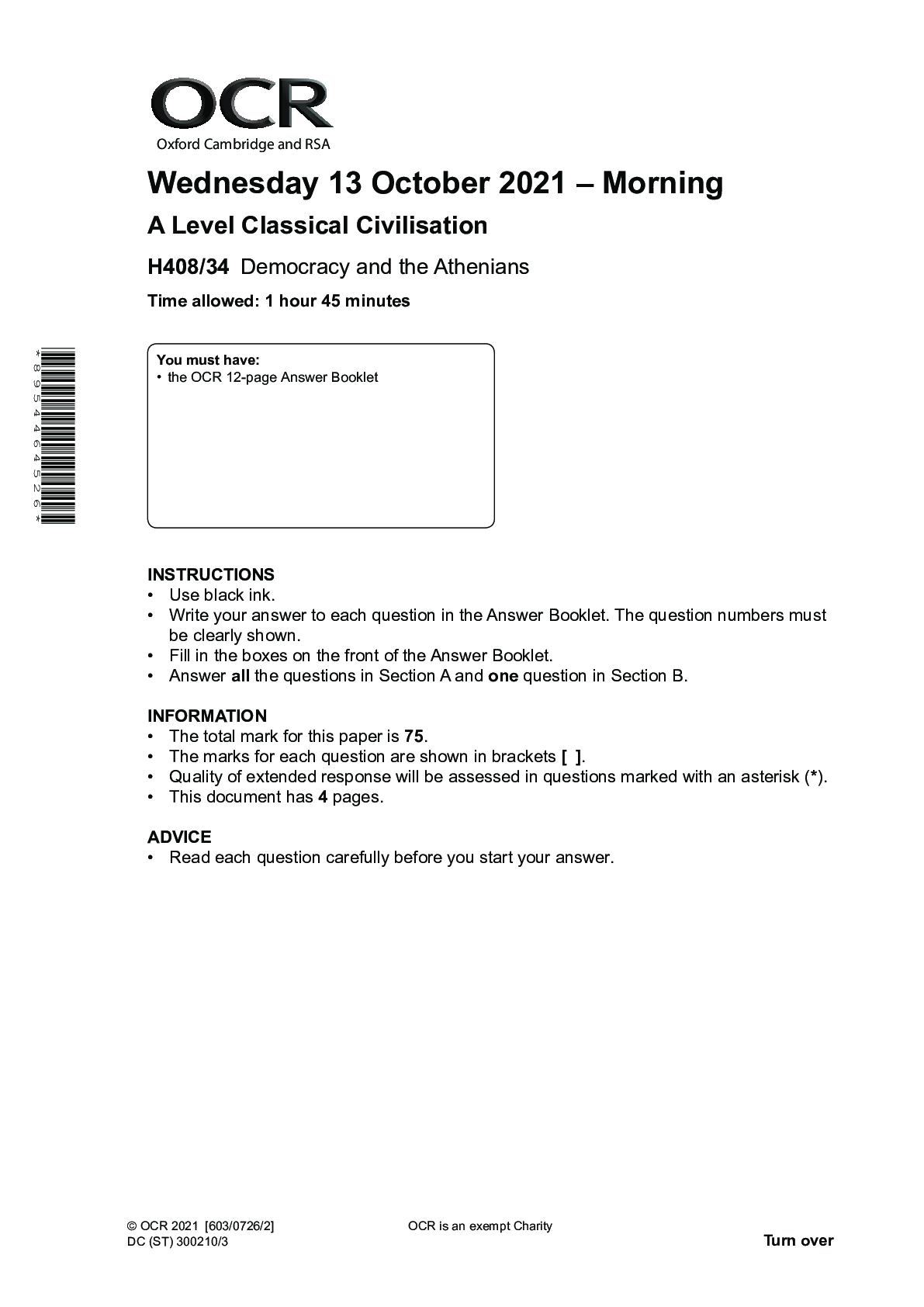
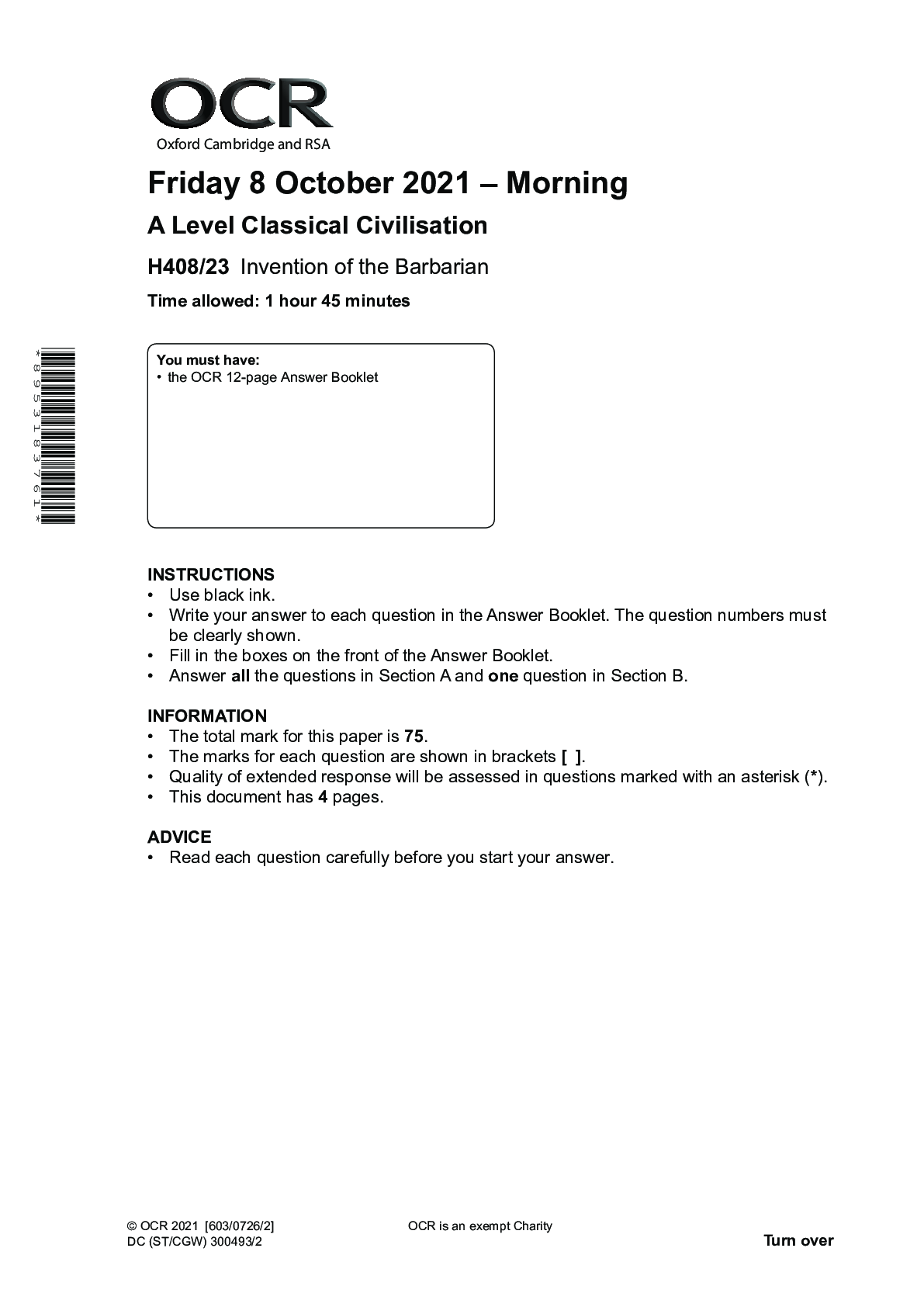
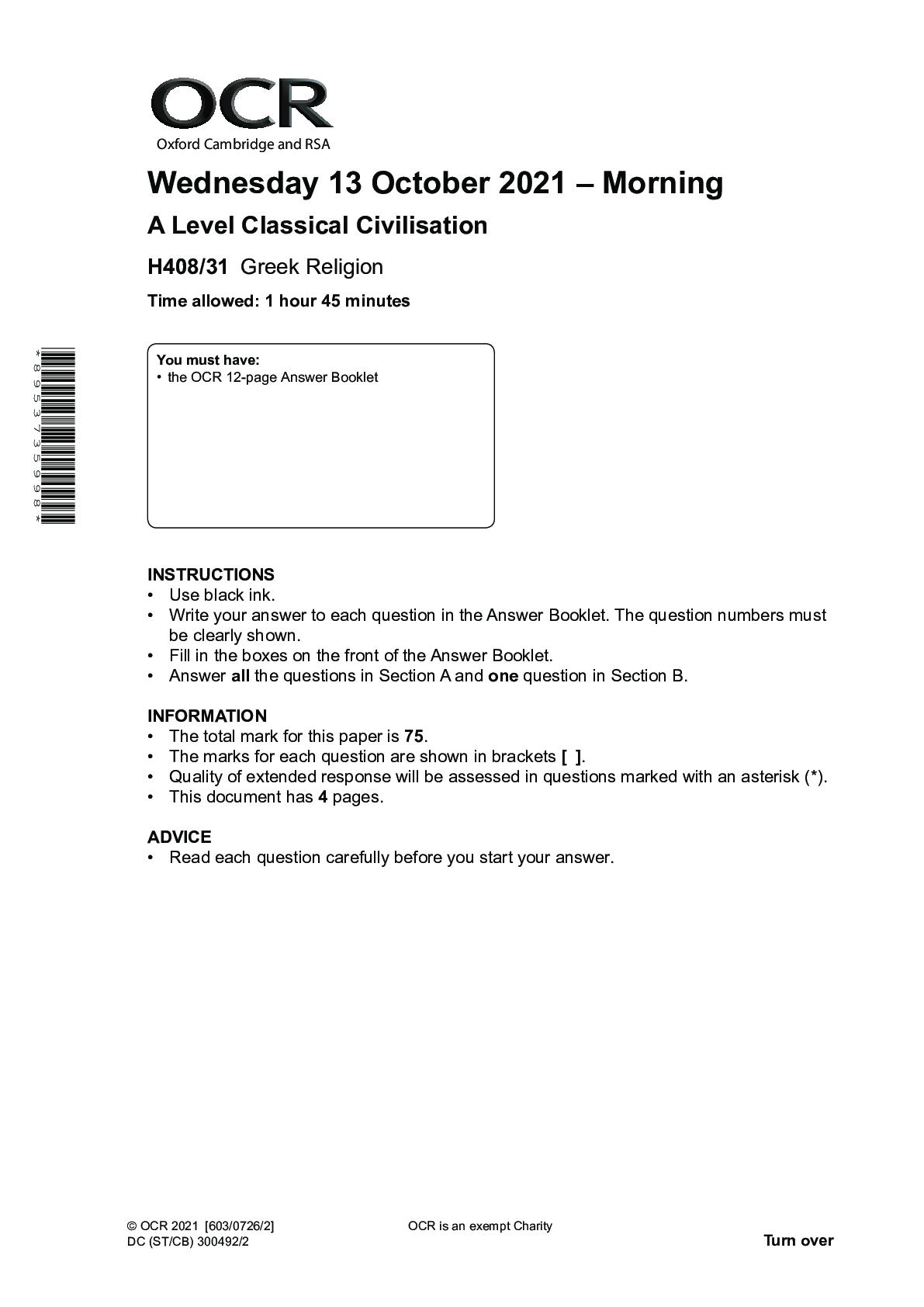

.png)
.png)
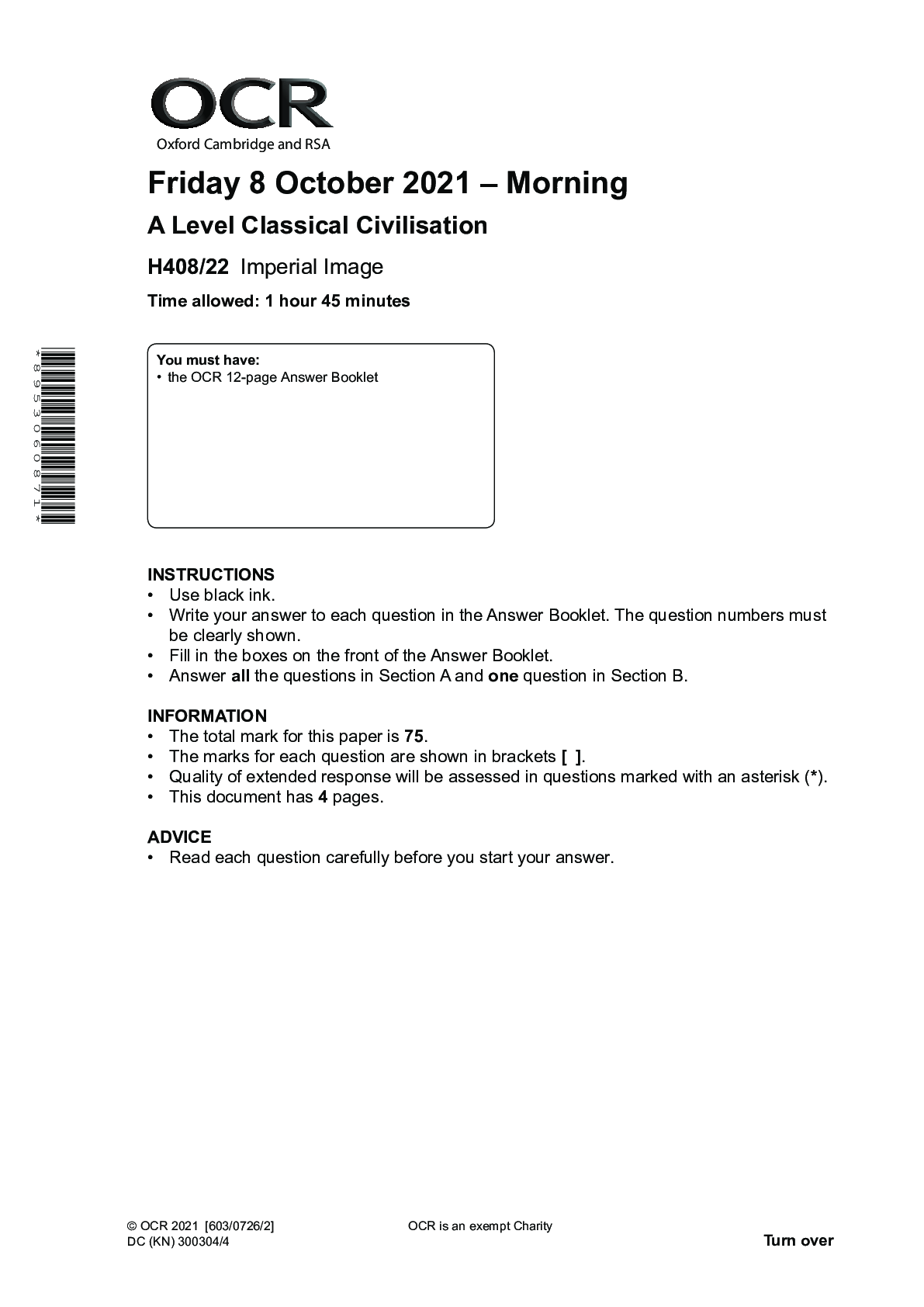
.png)

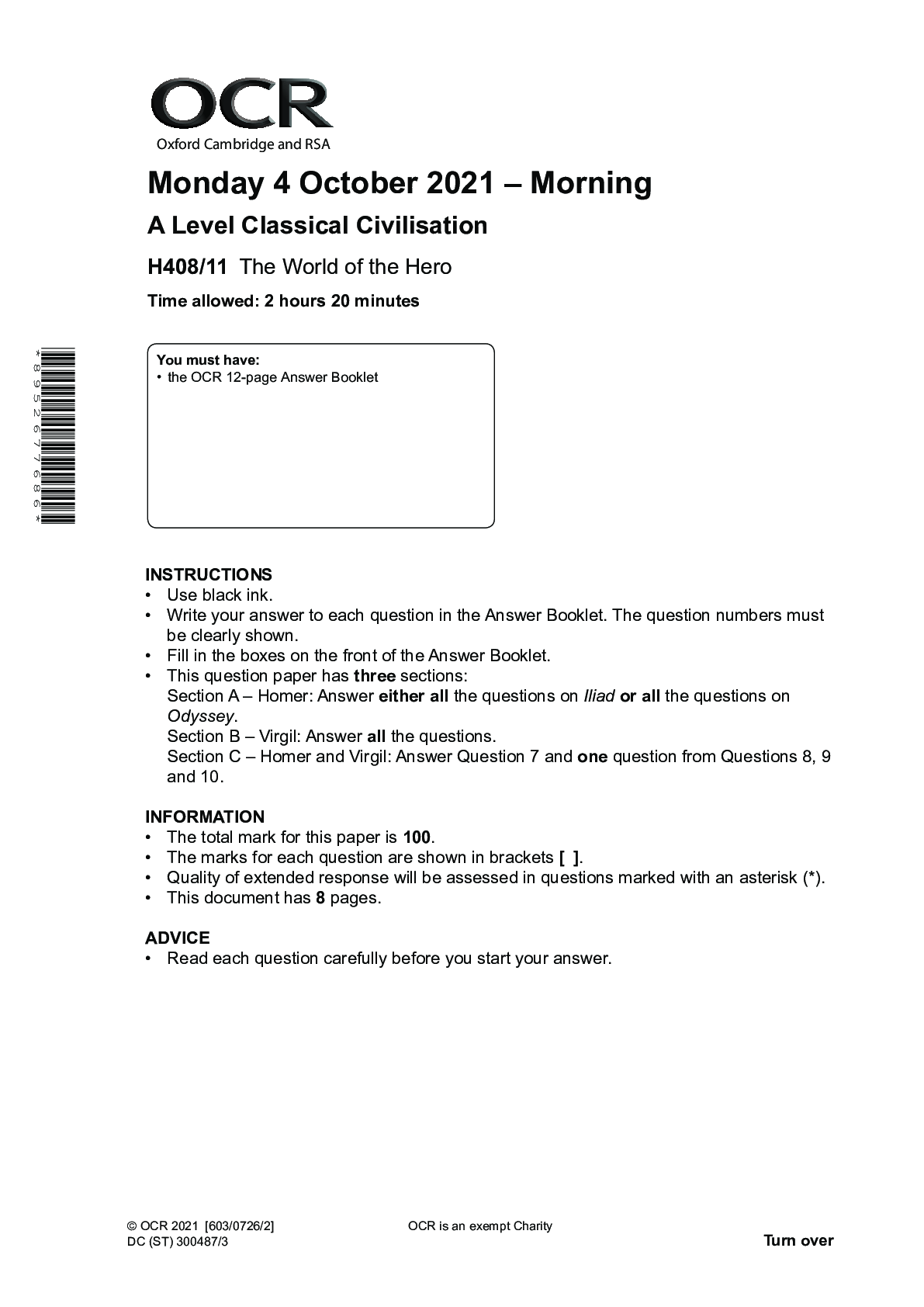
.png)

.png)
.png)
.png)
.png)
.png)
.png)
.png)
.png)
.png)
.png)
.png)

